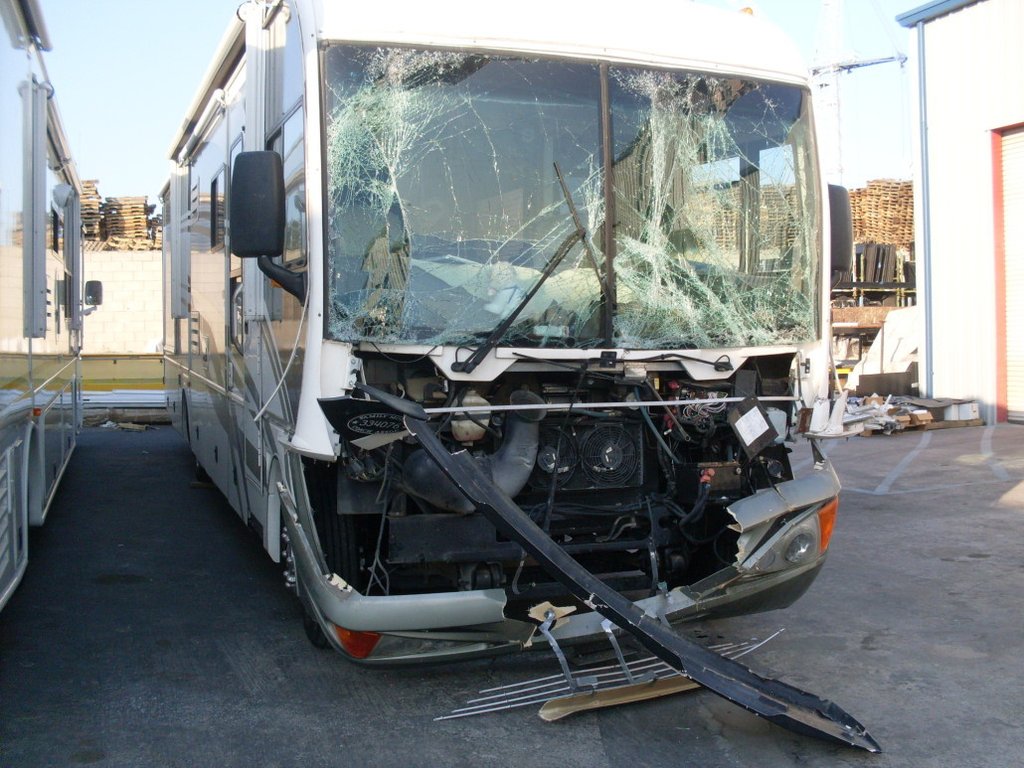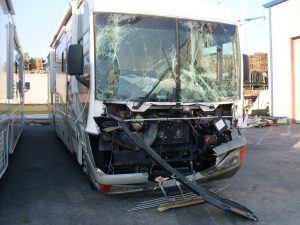Nobody wants to have an accident. But if you’re an RV owner, you know it’s a possibility. You also know that a collision or accident can involve an expensive RV repair.
There are ways to prepare and protect yourself and your vehicle before and after a collision. Let’s take a look at a few tips and hints for RV owners before and after an accident.
Insurance
The first thing you absolutely must do happens long before you ever hit the road. You need good RV insurance. Do the research necessary to insure your vehicle adequately.
Your RV insurance needs are going to vary based on the type of vehicle and how you use it. RV owners who live in their vehicle full-time will need different coverage than those who use their motorhome or trailers for vacations only.
Roadside assistance is another valuable investment. An RV that breaks down on the road isn’t only a headache for you and your passengers. The less time you need to wait for help, the less likely your vehicle is to be hit by passing traffic.
Tip: Make sure your insurance has enough coverage for your belongings. Check each insurance company you consider and see what they offer for this type of coverage and if there are dollar value caps. You want to have your investment insured for its true value.
The Basics
Make Sure Everyone is Okay
Most of the things you do in the immediate aftermath of an RV collision are the same things you do in any type of traffic or vehicle accident. The first, of course, is making sure everyone in your RV is okay.
RVs have hazards that regular vehicles do not. If things are not adequately secured in your coach, they can injure you or your passengers in an accident. They may also break, increasing your losses.
If it’s safe to do so, check on anyone else involved as well.
Tip: Make sure, every time you drive your RV, that your belongings are secured in latched or locked cabinets or compartments.
Call the Police
Never give in to the temptation to assume that everything is okay because you don’t see any damage after an RV collision. Of course, you’ll trade insurance information if there is another vehicle involved. But some insurance will not cover damages if a police report is not filed.
That police report will also help if there is some dispute down the road.
Document Everything
Make sure you have a copy of the police report and the insurance information of the other driver. Also, take pictures.
When you’re shaken up at the time of an accident it can be easy to forget that you have a camera right there on your phone. Take pictures at the scene of the collision, making sure to get as many angles as possible, both in and out of your vehicle.
If possible, pick up any pieces that may have come off of your RV. They might be helpful for your RV repair shop.
Tip: Never try to take pictures or pick up pieces if it is not safe to do so. Ask a police officer if you are unsure. No amount of vehicle damage is worth being hit by oncoming traffic.
Contact Your Insurance Agent
If you can, contact your insurance company before you leave the scene. An experienced agent may be able to calm you after an RV accident. They can help you make sure you get all the information you need.
They will also outline the next steps to take in the claims process.
Tip: Try and connect with your insurance agent before you ever need them. Discuss your policy details or changes. Knowing the person you’re dealing with can make the experience less stressful.
RV Repair
The next step is getting your RV repair underway. Like insurance, it’s good to find a reliable RV repair shop before you desperately need one. When you buy your RV, find a shop you trust so you don’t have to do that research after an accident.
If you have an RV collision that requires you to use an unfamiliar shop, ask lots of questions. Go online and look for recommendations in the area. Don’t hesitate to call your trusted home RV repair and maintenance shop for recommendations.
Tip: Make sure that any RV repair shop you use works with your insurance. For your local shop, this is information to get before you bring your motorhome or trailer in for its first maintenance visit.
If you have to use a shop on the road, make this one of the first questions you ask.
What’s the Damage?
Even if you don’t see any damage, don’t take chances. Have your RV thoroughly inspected. You’ll need two phases of inspection.
Under the Hood
If you’ve been in an RV collision, it’s important to make sure your vehicle is safe to drive. Before you begin other repairs, have a mechanic check your engine and do any necessary repairs.
RVs are in many ways just like any other vehicle, just on a larger and more complicated scale. Once the engine is good to go, it’s time for the next step.
Body Repair
This is where RV repair is vastly more intricate than other vehicle repairs. Your RV is an investment, one into which you’ve undoubtedly put considerable time and money. After any sort of RV collision or accident, you should have the interior and exterior inspected for damage.
Something you don’t notice can become a larger problem down the road. Catch it right away and it might be covered by your insurance, as well as far easier and less expensive to repair.
Exterior Damage
Cover the damaged area as best you can. This is particularly important if it will take a while to get to your RV repair shop or if the repair can’t be done immediately. Exterior damage exposed to the elements can lead to delamination and water damage.
Also, remember that an RV accident or collision can break or crack seals. This is a recipe for further damage and expensive repairs, so make covering your RV a priority.
Your RV repair shop will inspect your vehicle from roof sealants to tires, looking for everything from missing pieces to tiny cracks. Knowledgeable and experienced technicians are crucial. These are big vehicles that often have a lot of customization. A good team will go over your RV with a fine-toothed comb after a collision.
Tip: Plan ahead. Take pictures of your RV, both exterior and interior. Make sure you photograph things in detail so you have a reference if you do get into an accident.
Interior Damage
Make sure you document damaged belongings. Take pictures for the insurance company as soon after the accident as possible. Be honest about things that might have already needed repair before the collision.
Your RV repair shop will check for cracks, broken seals, damaged tanks, broken lights and appliances, and much more. Don’t hesitate to ask them to take pictures of all RV damage that they will repair. You’re likely to need them for insurance documentation.
Tip: Make sure your RV repair shop knows about any custom work you’ve had done or done yourself. The more they know about your RV, the sooner they can get you back on the road. They’ll also be able to better estimate replacement costs if they have documentation of the custom work.
The Bottom Line
You may never be involved in an RV accident or collision. But driving any sort of vehicle does come with some risks. You should always drive carefully, but sometimes things happen that you can’t control.
Having a plan for what you will do following an RV collision helps you remember important steps in a stressful situation. Make sure you have the phone numbers you need—insurance agent, RV repair shop, roadside assistance—in your vehicle and easily accessible.
Call or visit us at Leisure Coachworks with any questions about RV collision repair. We’ll help you prepare so that you can hit the road with confidence and enjoy the ride.

